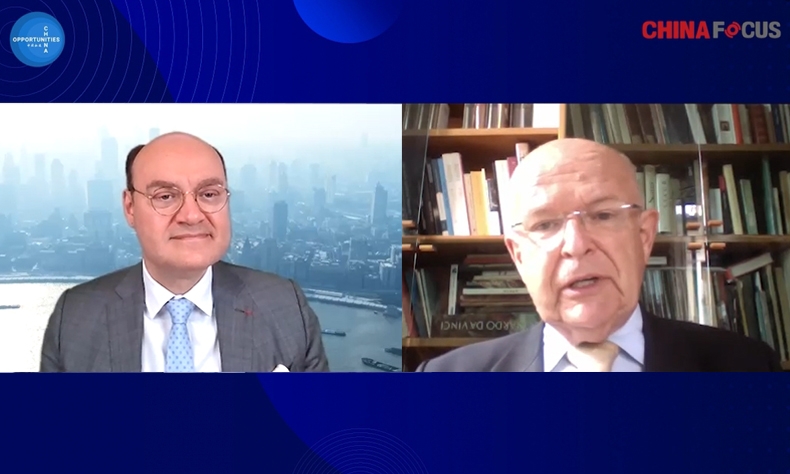
Chinese Cultural Renaissance in a World with Shared Future
China, with her millenary history, rediscovers the importance to play a fundamental role in the world connecting together Far West and Far East.
Editor’s Note: Along with rapid economic growth, Chinese culture is in a process of renaissance. David Gosset, the founder of Europe-China Forum, discussed with Louis Godart who is an Italian archeologist and has served as cultural advisor to three Italian Presidents. Pro. Godart gives his insight into the cultural renaissance in China and its significance to the world culture prosperity.
China Opportunities, hosted by Mr. Gosset, is a global dialogue with senior officials, business elites and distinguished people. The serial interviews are coproduced by China Focus and DG2CI Limited in association with Academy of Contemporary China and World Studies.
David Gosset: The Chinese economic transformation is very important, but what is also going on in China is a process of cultural renaissance. What are the opportunities, professor, offered by this Chinese cultural renaissance?
Louis Godart: What does it mean, the term renaissance? As you know, European countries and especially Italy invented this term to underline, in the 15th century after the Middle Age, the rediscovery of the values of classical civilization and the fundamental role assumed by the individual in history. Chinese (cultural) renaissance, I do believe, has exactly the same importance, because with the grandiose project of the new Silk Road (the Belt and Road Initiative), China, with her millenary history, rediscovers the importance to play a fundamental role in the world connecting together Far West and Far East. Let me say that this Chinese renaissance and the new Silk Road will give a fantastic opportunity to develop the economy of the Eurasian continent and involving also Africa in this project.
David Gosset: This is a very important point, professor. This analogy between the European renaissance and Chinese renaissance in the 21st century, this is a very profound notion. Professor, you participated not so long ago in a very interesting dialogue around museums. Actually, it was a dialogue between Europe, China and the United States of America around the notion of museums in the 21st century. Why do you think this dialogue is significant?
Louis Godart: Dear Professor Gosset, I would like to repeat what I said some days ago. It is clear that an international cooperation between important museums of the world offers to all citizens the possibility to appreciate the different cultures of our planet. If one European citizen is in admiration in front of the treasures of the Forbidden City, and if one Chinese is in admiration in front of the Acropolis in Athens or St. Peter’s in Rome, it is very easy to understand that the wind of peace and beauty blows between Far East and Far West, and the same happens when African, American or Australian visitors are in front of masterpieces created in the name of beauty. International cooperation between museums helps to build the world of tolerance, and this is exactly what we need in these difficult times.
David Gosset: Thank you very much, professor. You have been playing a very important role to deepen the cultural relations between China and Italy, and China and Europe. When you think about all the things you have been doing in the past, what are the most memorable souvenirs which pop up to your mind, professor?
Louis Godart: I must say different souvenirs of cooperation between Italy and China. In 2004, when I was counselor of President Ciampi, I had the pleasure and the honor to prepare his state visit in China, insisting on the cultural cooperation between Italy and China. And together with my friend Giuseppe Proietti, who was then General Secretary of the Italian Ministry of Culture, we negotiated a collaboration with the Chinese colleagues of the Forbidden City for the restoration of the throne room of the Chinese emperors. Italy and China had the privilege to collaborate in this important project, and I must say that both Italian and Chinese learned a lot working together in a splendid spirit of cooperation and peace. When President Ciampi made a state visit, we went, of course, in the throne room of the Forbidden City to underline this splendid cooperation between China and Italy. But let me say that finally, I remember the great exhibition we made together, you and me, with title “From the Old to the New Silk Road”, an exhibition organized in the Palace of the Quirinale between December 2006 and the spring of 2007.
David Gosset: Thank you very much, professor. Listening to you, I can feel the wind of peace and this wind of beauty blowing. This is very important at this complex moment in global affairs, but you told us very clearly, the Chinese renaissance is a great opportunity clearly for the Chinese people, but for the world at large. Thank you very much to be a part of this China Opportunities dialogue.
Louis Godart: Thank you very much.
David Gosset: Thank you.
 Facebook
Facebook
 Twitter
Twitter
 Linkedin
Linkedin
 Google +
Google +










